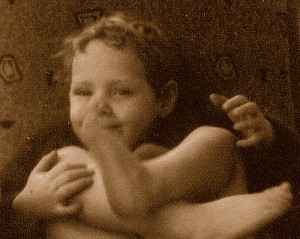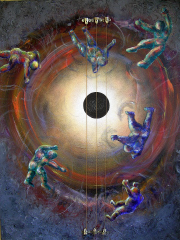Because of Manus Island
Our Values, which art in limbo,
Halos be thy… gone.
Thy fellow man come.
Thy racist greeting done
on earth, that we call Australian
Give us this day like a hole in the head Read the rest of this entry »
Our Values, which art in limbo,
Halos be thy… gone.
Thy fellow man come.
Thy racist greeting done
on earth, that we call Australian
Give us this day like a hole in the head Read the rest of this entry »
 The Idiosyncratic Personality Trait is referred to as ‘The Mastermind Trait’. It does not make one an obsessive-compulsive personality, who tend to be rigid and concrete factitions in their thinking. The Idiosyncratic Trait involves being the opposite; highly fluid in one’s thinking, speculative and abstract. Without these skills Einstein would not have been able to ‘think so far outside of the box’. Temple Grandin, who is the granddaughter of an engineer and inventor and an innovator in the meat processing industry has no history indicating Schizotypal Personality Disorder. Nevertheless, she has long touted Einstein as an example of autistic ability. Recent studies have found significant overlap between Schizotypal Personality Disorder and the autism spectrum. Read the rest of this entry »
The Idiosyncratic Personality Trait is referred to as ‘The Mastermind Trait’. It does not make one an obsessive-compulsive personality, who tend to be rigid and concrete factitions in their thinking. The Idiosyncratic Trait involves being the opposite; highly fluid in one’s thinking, speculative and abstract. Without these skills Einstein would not have been able to ‘think so far outside of the box’. Temple Grandin, who is the granddaughter of an engineer and inventor and an innovator in the meat processing industry has no history indicating Schizotypal Personality Disorder. Nevertheless, she has long touted Einstein as an example of autistic ability. Recent studies have found significant overlap between Schizotypal Personality Disorder and the autism spectrum. Read the rest of this entry »
 Since the development of iPads, many functionally non verbal people with autism have shown themselves able to express themselves independently. Others, however, have shown little interest in using an isolated finger to type or even point out icons or swipe pages on an iPad. When the same person sits stimming on their finger waggling, it is easy for some people to presume or imagine that person is to intellectually impaired they just don’t have the IQ to understand what the device is for, how to use it for themselves or why they might want to. Read the rest of this entry »
Since the development of iPads, many functionally non verbal people with autism have shown themselves able to express themselves independently. Others, however, have shown little interest in using an isolated finger to type or even point out icons or swipe pages on an iPad. When the same person sits stimming on their finger waggling, it is easy for some people to presume or imagine that person is to intellectually impaired they just don’t have the IQ to understand what the device is for, how to use it for themselves or why they might want to. Read the rest of this entry »
 So far we have been through the Medical Model of disability, then moved to the Social Model of disability and more recently the ‘pride movement’ moved on from the social model of disability to an Affirmation Model of disability. But in addition to the medical, social and affirmation models of disability, from this day forth I’d like to propose a new model… THE EMPOWERMENT MODEL Read the rest of this entry »
So far we have been through the Medical Model of disability, then moved to the Social Model of disability and more recently the ‘pride movement’ moved on from the social model of disability to an Affirmation Model of disability. But in addition to the medical, social and affirmation models of disability, from this day forth I’d like to propose a new model… THE EMPOWERMENT MODEL Read the rest of this entry »
 In the 60s autistic was the adjective to describe children with Kanner’s Syndrome which was then a form of ‘Infantile Psychosis’, psychotic children. As such it was psychiatrists and psychoanalysts who diagnosed autism. These ‘autistic’ children were rare, only 1 in 10,000 children were diagnosed with ‘infantile psychosis’ (the autism of its day). Read the rest of this entry »
In the 60s autistic was the adjective to describe children with Kanner’s Syndrome which was then a form of ‘Infantile Psychosis’, psychotic children. As such it was psychiatrists and psychoanalysts who diagnosed autism. These ‘autistic’ children were rare, only 1 in 10,000 children were diagnosed with ‘infantile psychosis’ (the autism of its day). Read the rest of this entry »
 He wrote the introduction to the diaries of Donald Friend, diaries detailing 10 years of Donald Friend’s sex with Balinese boys as young as 9 years old. In the introduction Barry Humphries referred to his friend as a “Benevolent Pedophile”, suggesting that as his friend had up to 20 of these ‘houseboys’ and gave accommodation and schooling in exchange for sex, that this was somehow benevolent, and Humphries certainly visited and stayed with Donald Friend during the 10 years, enjoying his ‘hospitality’. Read the rest of this entry »
He wrote the introduction to the diaries of Donald Friend, diaries detailing 10 years of Donald Friend’s sex with Balinese boys as young as 9 years old. In the introduction Barry Humphries referred to his friend as a “Benevolent Pedophile”, suggesting that as his friend had up to 20 of these ‘houseboys’ and gave accommodation and schooling in exchange for sex, that this was somehow benevolent, and Humphries certainly visited and stayed with Donald Friend during the 10 years, enjoying his ‘hospitality’. Read the rest of this entry »
 A large percentage of adults with Aspergers Syndrome (considered a form of ‘high functioning autism’) are employable, even if only able to manage part time work or minor self employment. Chronic underoccupation and unemployment is way too common for adults on the autism spectrum with around 80% being without paid work and most of those living on disability benefits even though a significant percentage of those people also do not identify as being ‘disabled’. Read the rest of this entry »
A large percentage of adults with Aspergers Syndrome (considered a form of ‘high functioning autism’) are employable, even if only able to manage part time work or minor self employment. Chronic underoccupation and unemployment is way too common for adults on the autism spectrum with around 80% being without paid work and most of those living on disability benefits even though a significant percentage of those people also do not identify as being ‘disabled’. Read the rest of this entry »
 “In his first Christmas message in the top job, Mr Abbott urged Australians to live up to their good nature and lend a hand to those doing it tough during the holiday season. ‘We are a good and generous people,’ he said in a statement on Tuesday. He also thanked those working for charities looking after the less fortunate on Christmas Day.
“In his first Christmas message in the top job, Mr Abbott urged Australians to live up to their good nature and lend a hand to those doing it tough during the holiday season. ‘We are a good and generous people,’ he said in a statement on Tuesday. He also thanked those working for charities looking after the less fortunate on Christmas Day.
So what’s wrong with that? Read the rest of this entry »
 My abuser claimed in a letter to me as an adult that she’s only ever ‘smacked me when I was bad’. Read the rest of this entry »
My abuser claimed in a letter to me as an adult that she’s only ever ‘smacked me when I was bad’. Read the rest of this entry »